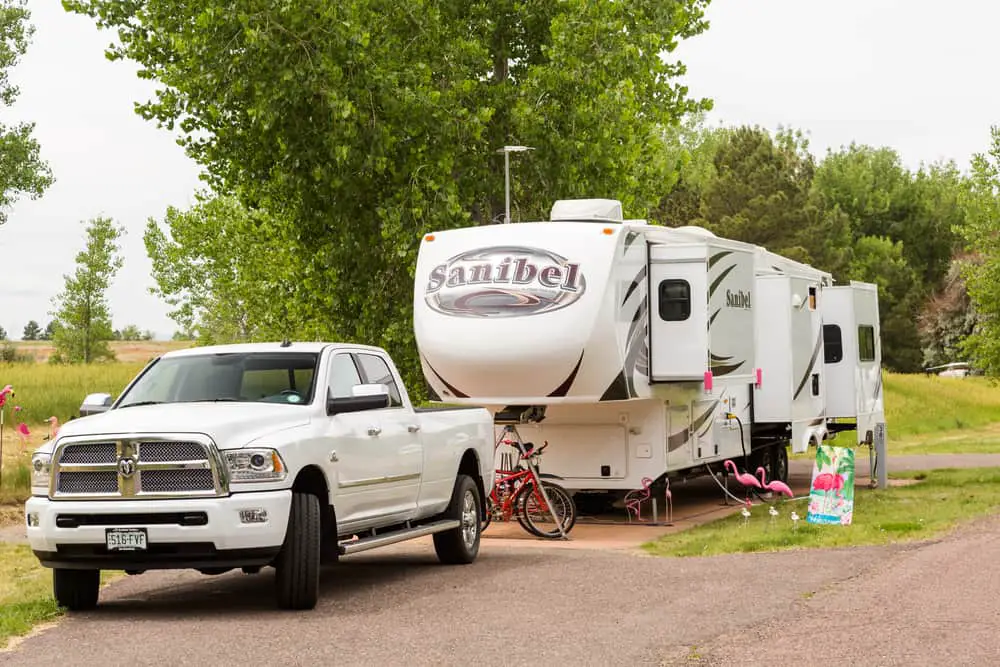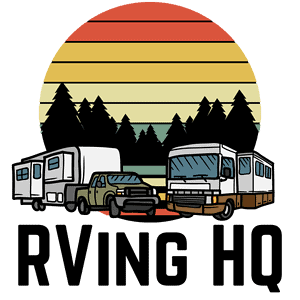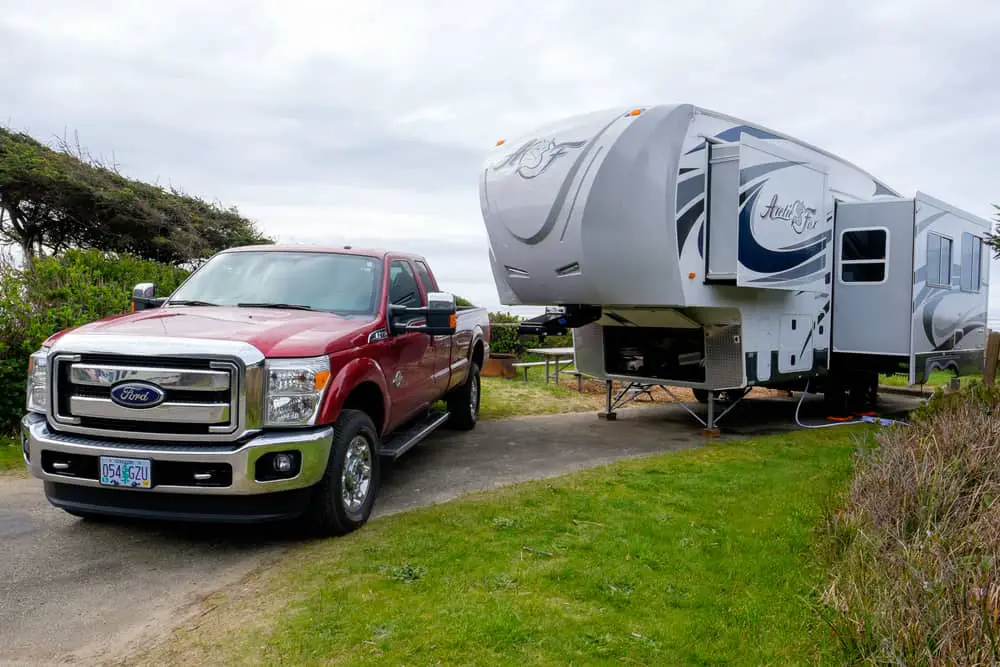Fifth wheel RVs are the largest towable campers with the most amenities and features. As you’re RV shopping or researching, you may be wondering: why are campers 5th wheel and not gooseneck?
Campers have 5th wheel hitches instead of gooseneck hitches because fifth wheel hitches provide a smoother ride, a more stable towing experience, less noise, less stress on the camper frame, and they’re more beginner friendly than towing with a gooseneck hitch.
We’ve known many RVers who prefer to use a gooseneck hitch and have swapped out their standard 5th wheel hitches for gooseneck hitches. So if that’s interests you, you can definitely go that route. In this article, we’re looking at the difference between these two types of hitches and the pros and cons of towing with both.
Table of Contents
Why Are Campers 5 Wheel and Not Gooseneck?
When it comes to towing large trailers, both fifth wheel and gooseneck hitches are popular choices. However, for recreational campers, the 5th wheel hitch has become the standard. Let’s dive deeper into the reasons why:
- Design and Comfort: The 5th wheel hitch design provides a smoother ride, especially for recreational vehicles. The pivot point of a 5th wheel is closer to the cab, which reduces the ‘chucking’ or jerking motion that you sometimes experience with gooseneck hitches. This makes for a more comfortable journey, especially over long distances.
- Ease of Hookup: Many users find that connecting a 5th wheel hitch is more straightforward than a gooseneck, especially when aligning the hitch and kingpin. The design of the 5th wheel hitch allows for easier visual alignment, which can be beneficial for those who aren’t towing regularly.
- Safety Features: 5th wheel hitches often come with additional safety features, such as jaw systems that securely lock the kingpin in place. This ensures that the trailer remains securely attached to the tow vehicle.
- Weight Distribution: The design of the 5th wheel hitch allows for better weight distribution across the axles of the towing vehicle. This can provide better stability and control, especially when towing large, heavy campers.
- Market Tradition: Over time, the RV industry has standardized around the 5th wheel design for larger campers. This means that there’s a broader range of products, accessories, and parts available for 5th wheel setups, making it more convenient for consumers.
Fifth Wheel vs. Gooseneck RV Hitches
The fifth wheel hitch is characterized by its large, flat plate that connects to a corresponding plate on the trailer via a kingpin. This design offers a high degree of stability, making it ideal for towing large and heavy trailers over long distances.
The connection’s centralized nature provides an even weight distribution, ensuring a smoother ride. Additionally, fifth wheel hitches often come with safety mechanisms that securely lock the kingpin, offering peace of mind to drivers. The design also allows for easier visual alignment during hookup, a feature particularly appreciated by occasional or novice towers.
On the other hand, gooseneck hitches connect to trailers using a ball and coupler system, which offers a tighter turning radius. This is particularly advantageous in settings where you need to do tight turns, such as farms or construction sites. Goosenecks also have a more streamlined profile, which can be less intrusive in the bed of the truck, allowing for more storage space. Moreover, they are often favored for their ability to handle extreme weight, making them a go-to for towing livestock or heavy machinery.
Pros and Cons of Gooseneck Hitches for RV Towing
Towing a fifth wheel RV with a gooseneck hitch involves using an adapter to make the connection. While some RV owners opt for this setup, it’s essential to weigh the pros and cons before making a decision.
Pros:
- Tighter Turning Radius: Gooseneck hitches offer a tighter turning radius compared to traditional fifth wheel hitches. This can be beneficial in situations where tight maneuvers are required.
- Less Bed Space Intrusion: Gooseneck hitches are generally less bulky than fifth wheel hitches. This means they take up less space in the truck bed, leaving more room for storage.
- Versatility: If you already use your truck for other tasks that require a gooseneck hitch (like towing livestock trailers), using an adapter for your fifth wheel RV means you don’t have to switch between hitch types.
- Cost: If you already have a gooseneck hitch installed, using an adapter can be more cost-effective than purchasing and installing a separate fifth wheel hitch.
- Capacity: Gooseneck connections are known for their ability to haul extremely heavy loads, and in some cases, using a gooseneck hitch can slightly increase the towing capabilities of your tow vehicle.
Cons:
- Stress on the RV Frame: Gooseneck adapters can place additional stress on the frame of the fifth wheel RV. This is because the force is concentrated on a smaller area compared to the broader distribution of a fifth wheel hitch. Over time, this can lead to structural issues or even frame damage.
- Reduced Stability: The adapter can introduce another potential point of movement or flex. This might reduce the overall stability of the towing setup, especially at highway speeds or in windy conditions.
- Voided Warranty: Some RV manufacturers specify that using a gooseneck adapter will void the warranty. It’s essential to check with your RV’s manufacturer before making any modifications.
- Potential for Reduced Safety: The added connection point (the adapter) can be a potential weak link in the towing setup. If not properly installed or maintained, it could compromise safety.
- Ride Comfort: Some users report that towing a fifth wheel RV with a gooseneck hitch and adapter results in a less smooth ride compared to a traditional fifth wheel hitch.
If you want to tow your fifth wheel RV with a gooseneck hitch, you can do this by using a fifth wheel to gooseneck adapter.
Which is Safer: A Fifth Wheel or Gooseneck Hitch?

Overall, a fifth wheel hitch is a safer option for towing an RV than a gooseneck hitch. While both hitch types provide better stability than a travel trailer or bumper-mounted hitch, only a fifth wheel hitch protects the stability of the RV itself and limits the stress on the camper frame.
Conclusion
When it comes to towing recreational campers, the choice between a fifth wheel and a gooseneck hitch is crucial. While both have their merits, the fifth wheel hitch emerges as the preferred choice for most RV enthusiasts, primarily due to its design that ensures a smoother ride, ease of hookup, enhanced safety features, and better weight distribution. The RV industry’s standardization around the fifth wheel design further attests to its advantages.
However, for those who prioritize tighter turning radii or have existing gooseneck setups, using an adapter can be a viable option, though it comes with its own set of considerations.
Ultimately, the decision rests on individual needs, the specific towing scenario, and the priority given to factors like safety, comfort, and convenience. Regardless of the choice, it’s essential to be well-informed and prioritize safety on the road.

